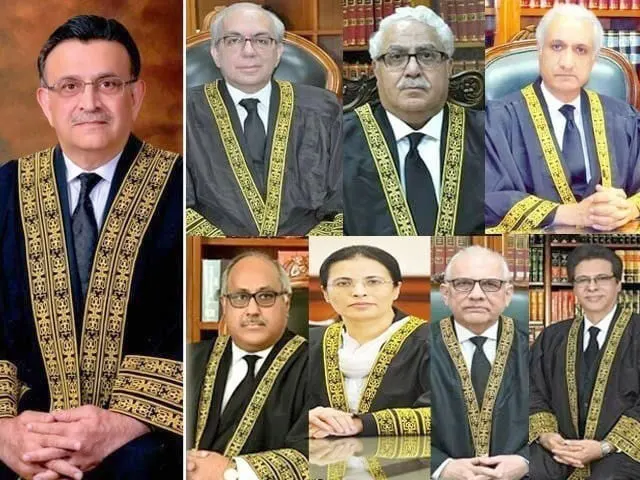Judges who wrote dissenting notes not part of bench
An eight-member larger bench, led by Chief Justice of Pakistan Justice Umar Ata Bandial, will hear petitions against the Supreme Court (Practice and Procedure) Bill today.
The development comes after the joint sitting of parliament passed the bill with amendments days after President Dr Arif Alvi returned the bill seeking to curtail the CJP’s powers to initiate suo motu and constitute benches amid protest by the Pakistan Tehreek-e-Insaf senators.
The bench included Justice Ijazul Ahsan, Justice Muneeb Akhtar, Justice Mazahir Naqvi, Justice Muhammad Ali Mazahar Naqvi, Justice Ayesha Malik, Justice Hasan Azhar Rizvi, and Justice Shahid Waheed. The judges who recently wrote dissenting notes are not part of the larger bench.
The bill was challenged in the apex court on Tuesday. One of the petitions, filed by Advocate Muhammad Shafay Munir, claimed that the bill should be declared illegal and unconstitutional as only the top court had the authority to make its own rules. The petition made the federation of Pakistan through its secretary and the minister for law and justice as respondents among others.
Munir filed a Constitutional petition under Article 184(3) to “safeguard the Constitution and independence of [the] judiciary as safeguarded and fully secured in the preamble of the Constitution”. The petition stated that during the proceedings of the Supreme Court’s suo motu hearing regarding the delay in Punjab polls, “the federal government along with [the] PDM (Pakistan Democratic Movement) started a vicious campaign in [the] general public and media to undermine the reputation and credibility of [the] honourable judges” of the SC, “especially” the CJP. It continued that with its “agenda”, the incumbent government through the Ministry of Law proposed a bill for the curtailment of powers of the CJP in a “hurry without adopting the due course of law and in violation of Article 70 (1 and 4) of the Constitution”. It stated that the bill was presented to the president for his assent but was sent for reconsideration by Alvi because it “was against the above-said Constitutional provisions”.
“Again, without taking into consideration and discussions on the objections by the president on [the] bill in question, the Parliament again in a hurry and without adopting the due course of law, beyond [the] powers of the Parliament, passed the bill on April 10 in a joint session”.
The petition contended that the Constitution had made it clear that the “independence of the judiciary” should be fully secured and the “Parliament has no powers to pass such an act to curtail the powers of [the] Supreme Court or its chief justice or the judges”. It maintained that the president had “highlighted the aspects” that required reconsideration, but the Parliament failed to reconsider the same and passed the bill beyond its powers.










